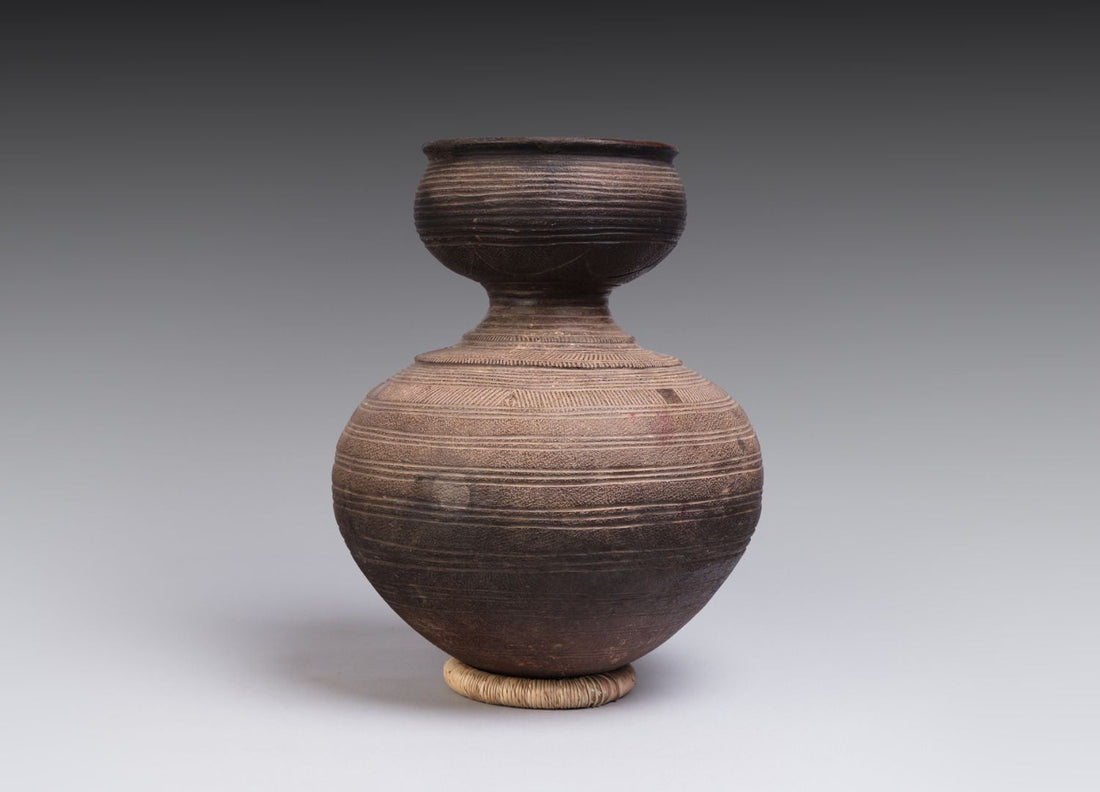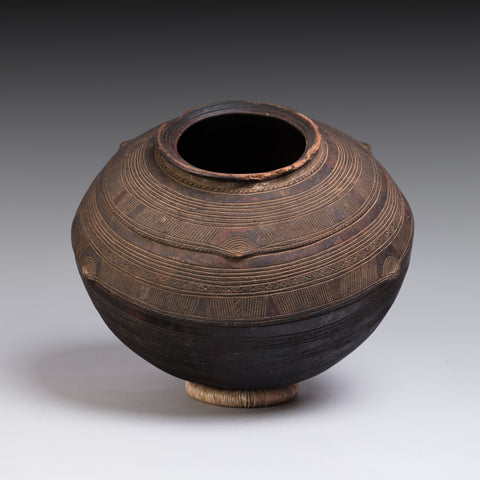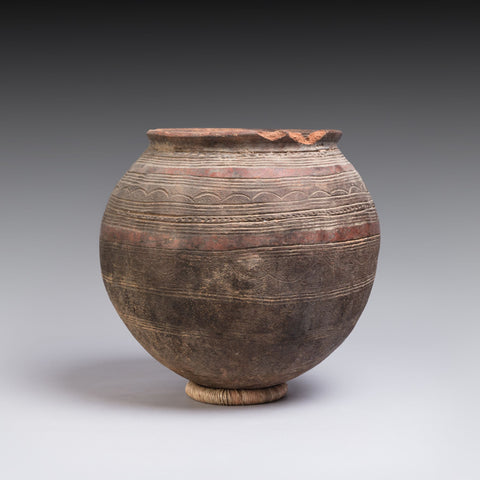
African Nupe Terracotta Pottery: Crafting Tradition, History, and Utility in Clay

African pottery is a window into the continent's rich culture and history. Among the various African pottery traditions, Nupe pottery from Nigeria stands out for its elegance and cultural significance. In this exploration, we'll dive into African pottery as a whole, focusing on the unique Nupe pottery. We'll uncover its history, craftsmanship, practical uses, and how it reflects centuries-old traditions.
African Pottery: A Canvas of Culture and Tradition
Before delving into the intricacies of Nupe pottery, it is crucial to understand the broader context of African pottery. Pottery in Africa is not merely a functional craft; it is a dynamic and expressive art form deeply intertwined with culture, tradition, and daily life. The history of African pottery dates back thousands of years, with each region, ethnic group, and community infusing its unique identity into the clay.
Historical Significance: The roots of African pottery can be traced to ancient civilizations, including the Nubians, Egyptians, and Great Zimbabwe. These civilizations utilized pottery for various purposes, such as storage, cooking, and religious rituals. Pottery artifacts have provided invaluable insights into the history and lifestyles of these ancient cultures.
Diverse Techniques: African pottery is characterized by its diversity of techniques and styles. Hand-building and coil construction are commonly employed methods, allowing artisans to create vessels of various shapes and sizes. The use of distinctive clay types, surface treatments, and firing methods adds depth to the artistry of African pottery.
Cultural Significance: Pottery in Africa transcends functionality; it embodies cultural symbolism and spiritual significance. Many pottery forms are used in rituals, ceremonies, and daily life, serving as vessels for food, water, and libations. The intricate designs and motifs on pottery often convey stories, myths, and ancestral connections.

The Nupe Pottery: An Artistic Legacy
Now, let us turn our attention to the Nupe people of Nigeria and their remarkable pottery tradition. The Nupe, residing primarily in the Niger state of Nigeria, have a rich heritage of crafting pottery that reflects their identity, history, and ingenuity.
Historical Roots: The history of Nupe pottery is deeply rooted in the traditions of this ethnic group. It is believed to have evolved over centuries, with pottery-making skills passed down through generations. Archaeological findings suggest that Nupe pottery dates back to ancient times, attesting to its enduring legacy.
Distinctive Characteristics: Nupe pottery is distinguished by its elegant, minimalist forms and exquisite craftsmanship. Artisans often create cylindrical pots with graceful proportions and narrow necks. These vessels are not only functional but also highly aesthetic, showcasing the Nupe people's artistic sensibilities.
Artistry in Design: The surface decoration of Nupe pottery is a testament to the artisans' skill and creativity. Geometric patterns, incised lines, and stylized motifs adorn the pots, transforming them into visual masterpieces. These designs are not mere embellishments; they carry cultural significance and convey messages about the pot's purpose.
Utility and Function: Nupe pottery serves a multitude of practical purposes in daily life. These pots are used for storing water, grains, and other essentials. Additionally, they play a pivotal role in the preparation of local delicacies, as they are ideal for slow-cooking soups and stews. Nupe pots were stacked in rows on partially buried terracotta vessel supports inside Nupe houses. The base is rounded as these pots were carried on the head using cloth rings for support. Constant use over many years would leave behind lighter tones around the base.

The Nupe Pottery Tradition: Preservation and Evolution
One of the most remarkable aspects of Nupe pottery is its ability to adapt and evolve while preserving its core traditions. Over the centuries, Nupe pottery has continued to thrive, adapting to changing circumstances and maintaining its cultural relevance.
Sustainability: Nupe pottery is characterized by its sustainable practices. Artisans source clay from the riverbanks, where the earth's natural composition lends unique qualities to the pottery. The traditional firing techniques, using open wood fires, not only produce distinctive colors but also minimize environmental impact.
Women Empowerment: In Nupe society, pottery-making is predominantly the domain of women. These skilled artisans have played a crucial role in preserving and transmitting the pottery tradition. The economic empowerment of women through pottery production has contributed to the community's resilience.
Contemporary Expressions: While Nupe pottery remains rooted in tradition, contemporary artists and potters have introduced innovative elements to the craft. Some artisans experiment with new forms, glazes, and decorative techniques, demonstrating the adaptability of the tradition to modern contexts.
African Pottery: A Kaleidoscope of Diversity
Beyond the Nupe pottery tradition, Africa boasts a kaleidoscope of pottery practices, each offering a unique glimpse into the cultural tapestry of the continent. Let us explore some notable pottery traditions from different African regions.
- Zulu Beer Pots: In South Africa, Zulu beer pots are revered for their functionality and artistic beauty. These pots are traditionally used to brew and store traditional Zulu beer. The distinctive shape and intricate decorations on these pots are emblematic of Zulu cultural identity.
- Berber Pottery: Berber pottery from North Africa is renowned for its vibrant colors and intricate patterns. The Berber people incorporate geometric and symbolic designs into their pottery, reflecting their spiritual beliefs and desert heritage.
- Ashanti Ceramics: The Ashanti people of Ghana are celebrated for their exquisite ceramic figurines and vessels. These objects are not only utilitarian but also hold religious significance, often featuring motifs associated with the Ashanti pantheon of deities.
- Tuareg Tagelmust Flask: The Tuareg people of the Sahara Desert craft unique tagelmust flasks for the storage and transportation of water. These flask-shaped vessels are decorated with distinctive Tuareg designs, reflecting the nomadic lifestyle of the Tuareg community.
Conclusion: African Pottery - Legacy, Culture, and Artistry
In conclusion, African pottery is a captivating journey through the continent's history, culture, and artistry. The Nupe pottery tradition, with its elegance and cultural significance, serves as a shining example of how pottery can encapsulate a people's identity. As we traverse the diverse landscapes of African pottery, from the graceful Nupe pots to the intricately decorated Zulu beer pots and the spiritually charged Ashanti ceramics, we witness the vibrant mosaic of creativity that defines African art.
African pottery is not just a functional craft; it is a living testament to the enduring legacy of traditions passed down through generations. It is a canvas for cultural expression, a reservoir of historical knowledge, and a symbol of resilience. Through the hands of skilled artisans, clay is transformed into vessels that bridge the past and the present, connecting us to the rich tapestry of African heritage. The world of African pottery is a testament to the continent's artistry, history, and the enduring spirit of its people.




6 comments
Vielen Dank für Ihre Nachricht. Wir haben Ihnen eine E-Mail gesendet.
ich suche für meine Keramiksammlung aus Westafrika /Ghana, Marocco und Ostafrika Tanzania aus Altersgründen eine geschützte Bleibe in ener Ausstellung o.ä. Ich will nicht verkaufen sondern stiften o.ä Könnten Sie mir da weiter helfen evtl. ? Ich bitte höflich um eine Antwort.
Frdl. Gr. ULM Ute Läscke-Maas, Am Trotz 39, 24558 Henstedt-Ulzburg
Hi Michael. We have responded to your email. We hope to see you soon.
Hi, I have sent an email enquiring about one of your Nupe pots. I would like to visit your gallery.
Thanks Michael. We have a very large Nupe pot collection at our London gallery.